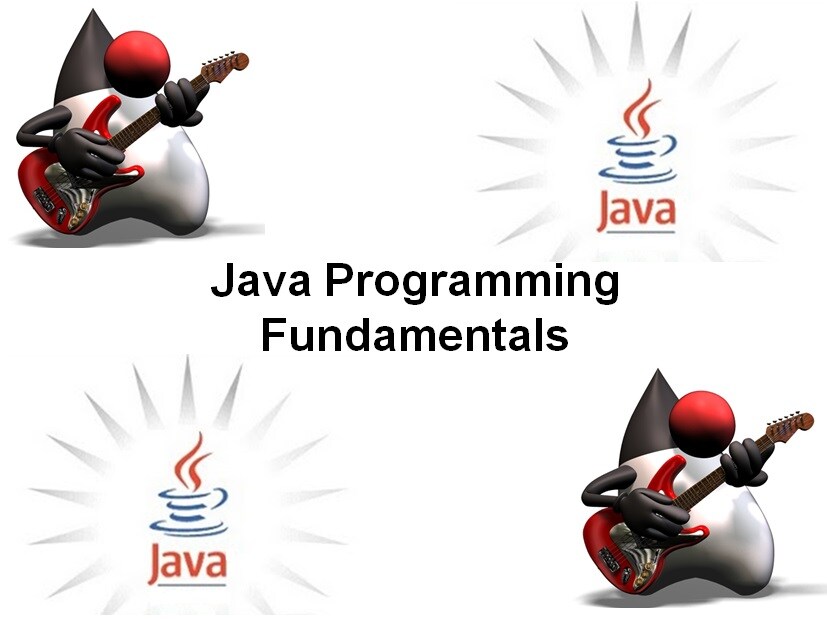-
Learning by doing
-
Trainers with practical experience
-
Classroom training
-
Detailed course material
-
Clear content description
-
Tailormade content possible
-
Training that proceeds
-
Small groups
The course Java Programming Fundamentals covers the fundamentals of programming in Java based on version 8 of the Java platform. In addition to the fundamentals of Java, the innovations in Java 8 such as lambdas, optionals and the stream API are also covered in the course.
By means of successive exercises in a case study, participants learn to program with the variables, data types, operators and control flow constructions of the Java language.
The course then discusses object oriented concepts such as class, object, encapsulation, inheritance and polymorphism. Attention is paid to errors and exception handling and it is discussed how Java software is organized in packages.
Also the split of a program into different subtasks with threads and the synchronization of these threads is the subject in the course.
Parameterized types, generics, and their use in the Collection Framework are also part of the course program. Optional modules, if time permits it, are access to databases with JDBC and Java Beans.
This course is a good preparation for the Java 8 OCA , Oracle Certified Associate, exam. In combination with the Advanced Java Programming course this course also prepares for the Java 8 OCP, Oracle Certified Professional, exam.
The course Java Programming Fundamentals is intended for developers who want to learn Java Programming and other persons who want to understand Java code.
Basic knowledge of and experience with programming is recommended. Principles of Object Oriented Programming using Java are explained. Prior knowledge of this is beneficial but not necessary for the understanding.
The theory is treated on the basis of presentations and is interspersed with exercises. Demos are used to clarify the theory. The course uses Java 8. The course material is in English. The course times are from 9.30 up and to 16.30.
Participants receive an official certificate Java Programming Fundamentals after successful completion of the course.

Module 1 : Basic Concepts |
Module 2 : Language Syntax |
Module 3 : Classes and Objects |
|
Java Overview Language Editions Java Platform Java Community Process Application Types Compiling and Running Compiler and Interpreter Application Structure Garbage Collection |
Types of Variables Primitive Data Types Block Statements if else Statements switch Statement for and while Loop break and continue Arrays and Strings Formatted Output |
Class Definition Encapsulation Access Modifiers Constructors Fields and Methods static Modifier this Keyword Parameter Passing Method Overloading |
Module 4 : Inheritance |
Module 5 : Exception Handling |
Module 6 : Packages |
|
extends Keyword Overriding Methods Hiding Attributes Calling Base Constructors Polymorphism Abstract Classes Interfaces Default Methods Type Casting Implicit and Explicit Casting Cloning Objects |
Error and Exceptions Checked and Unchecked Multiple Catch Clauses finally Clause try with Resources Common Exceptions Throwing and Rethrowing User Defined Exceptions Chained Exceptions Stack Traces Assertions |
Standard Java Packages java.lang Package Packages and Directories Importing Classes Full Class Names Using Packages CLASSPATH import static Packages and Visibility Packaging in JAR Runnable JARS |
Module 7 : Threads |
Module 8 : Synchronization |
Module 9 : Special Classes |
|
Java Thread Model Thread Class Runnable interface Extending Thread Implementing Runnable Daemon Threads Thread Life Cycle States Sleeping and Yielding Control Using join and interrupt Thread Priorities |
Synchronization Mechanisms synchronized Modifier Blocking on a Monitor Mutual Exclusion in Java synchronized Block Locking and Statics Deadlock Condition Synchronization Using wait and notify while Loop and notifyall |
Inner Classes Types of Inner Classes Anonymous Inner Classes Static Inner Classes Lambdas Functional Interfaces Enumerations Enums as Constant Objects Enums are Classes Enum Methods and Fields |
Module 10 : Utility Classes |
Module 11 : Collection Framework |
Module 12 : Generics |
| Object Class Wrapper Classes Autoboxing and Unboxing Overriding equals Math Class Date and LocalDate Regular Expressions Scanner and System Class Localizing Dates and Numbers |
Framework Branches Collection and Map Interface Iterator Interface List Interface ArrayList and LinkedList Class Set and SortedSet Comparable Interface Comparator Interface map, filter and foreach Method |
Need and Benefits of Generics Generics in Collections Type Erasure Bounded Type Parameter Generics and Subtyping Wildcards Bounded Wildcards Raw Types Generic Methods |
Module 13 : Stream I/O |
Optional Module : JDBC |
Optional Module : Java Beans |
| I/O Basics and Classes Byte and Character Streams Data Sink Streams Processing Streams Buffered Streams Data Conversion Streams Serialization Object Streams |
JDBC Overall Architecture JDBC Drivers and URL's Class forName Making Connections Executing a Statement Retrieving Results Transactions Prepared Statements |
Software Components Java Beans Properties Getters and Setters Bean Component Model Bean Event Pattern Event Firing Event Listener Interface |
